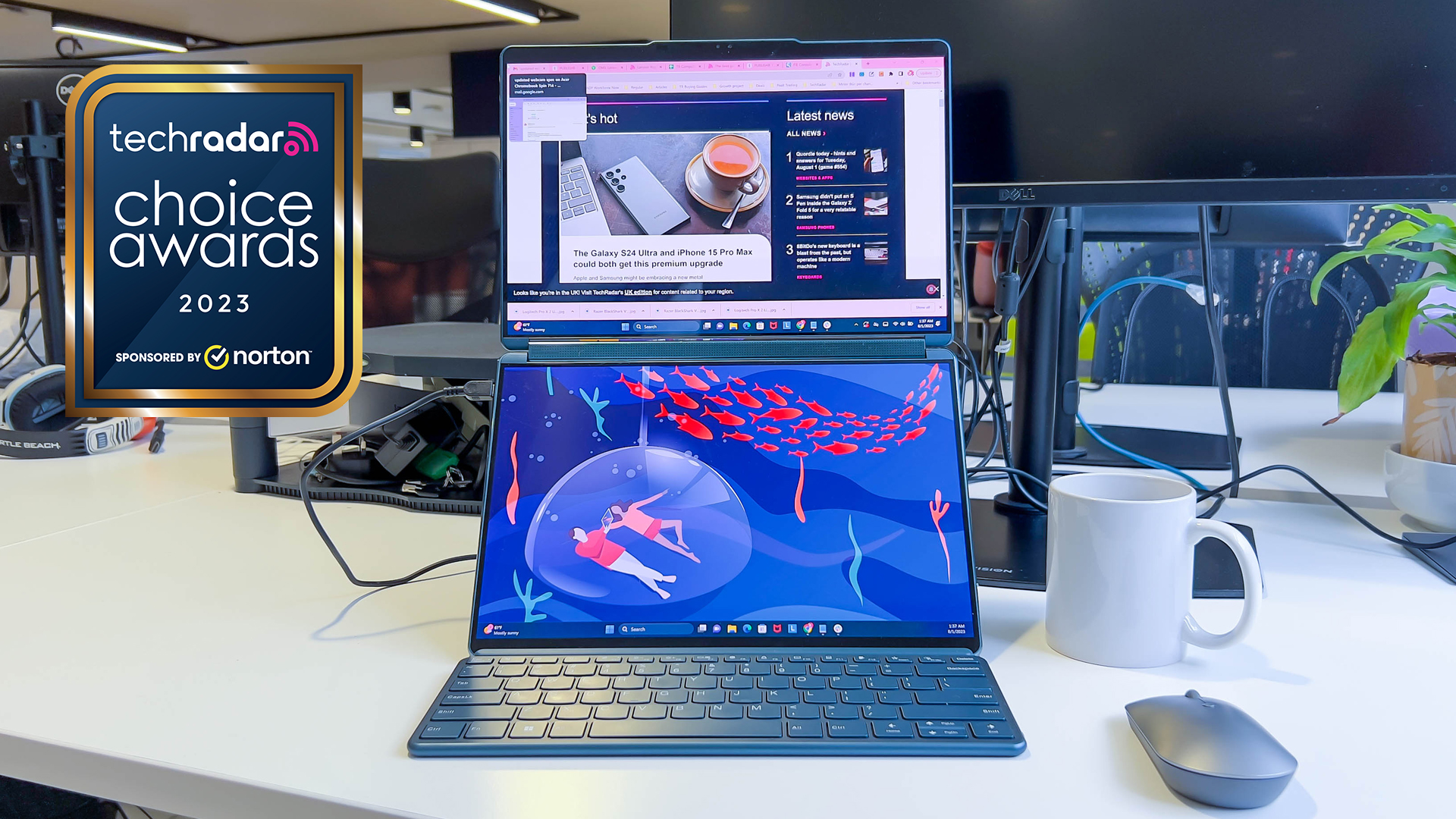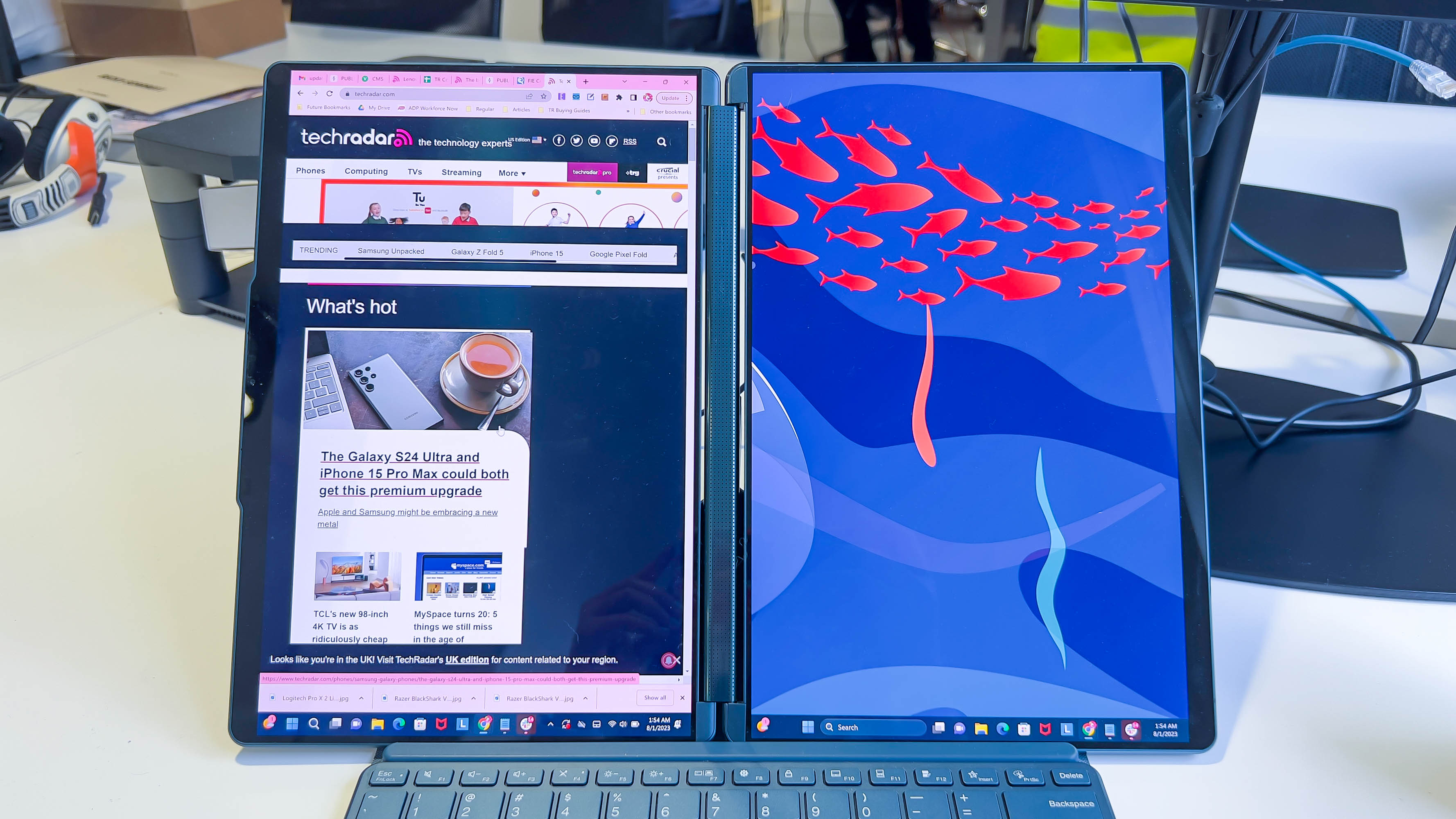How the Lenovo Yoga Book 9i beat the mighty MacBook Pro to our Laptop of the Year award
A bold reimagining

I've been reviewing laptops for years, so it takes a lot for me to get my mind blown by one these days – but that's exactly what happened the first time I saw the Lenovo Yoga Book 9i in use, so for me, there really was no other choice for laptop of the year in the TechRadar Choice Awards 2023, sponsored by Norton.
This is a laptop that proves that putting two screens on a laptop doesn't just have to be a gimmick (something the likes of the Asus Zenbook Duo lineup have struggled to do).
The laptop opens up to show off two gorgeous 13.3-inch 2.8K OLED screens, which look phenomenal. You can use the two screens (which are connected via a hinge) vertically for a book-like reading experience, which is handy for studying, but if you turn the screens horizontally, you get essentially a dual-screen Windows 11 desktop, giving you a huge amount of workspace to use.
It comes with a detachable keyboard, so typing away feels just as comfortable as with a traditional laptop, and by using the keyboard on a desk, the two screens can be used purely for apps and windows. However, there's one more lovely touch: if you fold the Lenovo Yoga Book 9i into a laptop-like shape, and place the keyboard on the surface of the bottom screen, it snaps into place, and uses the rest of the bottom screen as a large touchpad.
As we said in our Lenovo Yoga Book 9i review, it's this kind of inventiveness and flexibility which really makes the machine stand out in a market place that is filled with excellent – but predictable – laptops. Take the MacBook Pro 14-inch (2023), for example: the previous version won this award last year, shaking up the whole pro laptop world in the process… but this year's edition is practically identical. No shaking here.

Shaking up the form-factor
The best laptops of 2023 are more powerful than ever, and many boast incredible battery lives, but pretty much all of them stick to the same tried-and-tested clamshell design that laptops have had for over 30 years.
That's not particularly surprising, as the classic laptop form factor has remained pretty much unchanged for decades because, frankly, it does the job so well. A screen on the top, a keyboard and track pad on the bottom, and by folding the laptop, you get a portable device whose screen is protected when being carried around.
When laptop makers try to shake things up with their products' designs, they often miss the mark by overcomplicating things and failing to add enough benefits that justify the complexity of the new design – and the added expense that usually accompanies it.
Not so with the Lenovo Yoga Book 9i, as its dual-screen design can really help boost your productivity, while remaining thin and light enough to be easily portable.
It's packed with impressively powerful hardware as well, including a 13th Generation Intel Core i7-1355U, 16GB of RAM, and up to 1TB of speedy SSD storage.
Impressively, you're not sacrificing battery life for these powerful components and extra screen – we got almost 10 hours of use out of the Lenovo Yoga Book 9i with both screens on – and over 12 hours with just one display in use, so it'll last a full work day as well.
The Lenovo Yoga Book 9i is an exciting glimpse of the future of laptops, and a bold reimagining of what can sometimes feel like an over familiar form factor. While the price ($1,999 / £2,299 / $4,299) means this certainly isn't for everyone, it's an innovative product that easily justifies its Laptop of the Year award.
Get daily insight, inspiration and deals in your inbox
Sign up for breaking news, reviews, opinion, top tech deals, and more.

Matt is TechRadar's Managing Editor for Core Tech, looking after computing and mobile technology. Having written for a number of publications such as PC Plus, PC Format, T3 and Linux Format, there's no aspect of technology that Matt isn't passionate about, especially computing and PC gaming. He’s personally reviewed and used most of the laptops in our best laptops guide - and since joining TechRadar in 2014, he's reviewed over 250 laptops and computing accessories personally.